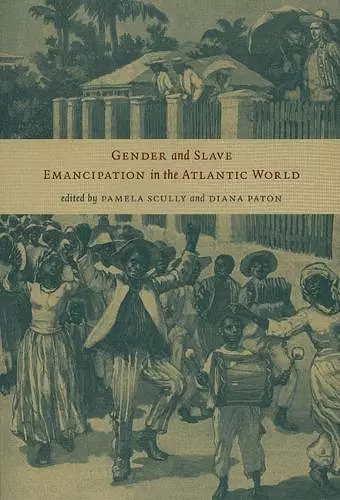Gender and Slave Emancipation in the Atlantic World
Diana Paton editor Pamela Scully editor
Format:Paperback
Publisher:Duke University Press
Published:4th Oct '05
Currently unavailable, and unfortunately no date known when it will be back

A comparative perspective on the way ideas of gender relations and identities shaped the struggle over resources, cultural practices, and political rights that followed the end of slavery in the Atlantic world
This groundbreaking collection provides the first comparative history of gender and emancipation in the Atlantic world. Bringing together essays on the United States, Brazil, Cuba, Puerto Rico, West Africa and South Africa, and the Francophone and Anglophone Caribbean, it shows that emancipation was a profoundly gendered process, produced through connections between race, gender, sexuality, and class. Contributors from the United States, Canada, Europe, the Caribbean, and Brazil explore how the processes of emancipation involved the re-creation of gender identities—the production of freedmen and freedwomen with different rights, responsibilities, and access to citizenship.
Offering detailed analyses of slave emancipation in specific societies, the contributors discuss all of the diverse actors in emancipation: slaves, abolitionists, free people of color, state officials, and slave owners. Whether considering the construction of a postslavery masculine subjectivity in Jamaica, the work of two white U.S. abolitionist women with the Freedmen’s Bureau after the Civil War, freedwomen’s negotiations of labor rights in Puerto Rico, slave women’s contributions to the slow unraveling of slavery in French West Africa, or the ways that Brazilian abolitionists deployed representations of femininity as virtuous and moral, these essays demonstrate the gains that a gendered approach offers to understanding the complex processes of emancipation. Some chapters also explore theories and methodologies that enable a gendered reading of postslavery archives. The editors’ substantial introduction traces the reasons for and patterns of women’s and men’s different experiences of emancipation throughout the Atlantic world.
Contributors. Martha Abreu, Sheena Boa, Bridget Brereton, Carol Faulkner, Roger Kittleson, Martin Klein, Melanie Newton, Diana Paton, Sue Peabody, Richard Roberts, Ileana M. Rodriguez-Silva, Hannah Rosen, Pamela Scully, Mimi Sheller, Marek Steedman, Michael Zeuske
“This anthology links Africa, Latin America, the Caribbean, and the United States in its analysis of the role of gender in creating new social orders after the end of slavery. Taken together, the essays are clear, compelling, complex, and ultimately unsettling in their evocation of a past filled with hope for great change and largely effective struggles for its containment.”—Eileen Findlay, author of Imposing Decency: The Politics of Sexuality and Race in Puerto Rico, 1870–1920
“This innovative volume highlights the quite different ways in which men and women achieved freedom and faced the possibility of citizenship in postemancipation societies. By examining ideologies of gender as well as differences in experiences, the contributing authors broaden our understanding of emancipation as a transformative process. By placing women of color at the center of the analysis, moreover, many of these authors develop a new picture of the dynamics of emancipation.”—Rebecca Scott, author of Degrees of Freedom: Louisiana and Cuba after Slavery
“[A] must-read for scholars of the Atlantic world, gender history, colonial studies, and comparative slavery and emancipation. The clearly written introduction and tightly edited chapters are suitable for both undergraduate and graduate students, while the bibilographic essay is a good starting point to the historiography of some of the major debates.” -- Kerry Ward * International Journal of African Historical Studies *
“[A] thought-provoking collection of essays . . . valuable for its discussions of divergent gender ideals among men and women slaves, elites and non-elites, planters, abolitionists, and missionaries. It is most important for its descriptions of the efforts of former slaves to contest and define what it meant to be free and male, versus free and female, in the aftermath of emancipation.” -- Kathleen Higgins * American Historical Review *
ISBN: 9780822335948
Dimensions: unknown
Weight: 562g
392 pages